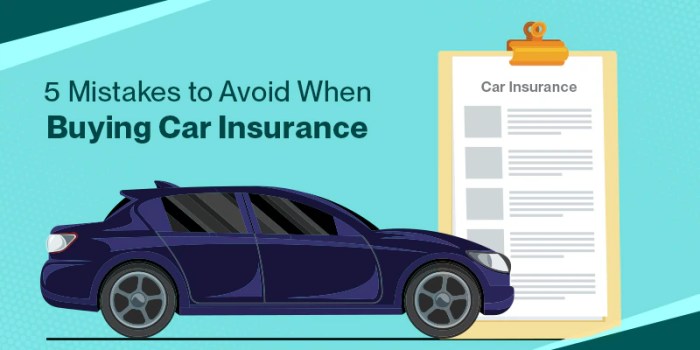Exploring the realm of auto insurance shopping, this guide delves into the common pitfalls individuals encounter and how to steer clear of them. With a focus on practical advice and key insights, readers are invited to navigate the intricacies of securing the right coverage for their vehicles.
Delving deeper into the nuances of auto insurance selection, this guide sheds light on crucial factors and considerations that can significantly impact one's insurance choices.
Factors to Consider When Shopping for Auto Insurance
When selecting auto insurance, there are several key factors individuals should consider to ensure they get the coverage that best fits their needs and budget. Understanding these factors can help drivers make informed decisions and avoid costly mistakes.
Types of Coverage
- Liability Coverage: This type of coverage pays for the medical expenses and property damage of other drivers in an accident where you are at fault.
- Collision Coverage: This covers the cost of repairs to your own vehicle in the event of a collision, regardless of fault.
- Comprehensive Coverage: Provides coverage for damages to your vehicle caused by incidents other than collisions, such as theft, vandalism, or natural disasters.
- Uninsured/Underinsured Motorist Coverage: Protects you in the event of an accident with a driver who does not have insurance or enough coverage.
Personal Driving Habits Impact
Personal driving habits play a significant role in determining insurance rates. For example, individuals with a history of accidents or traffic violations are likely to pay higher premiums due to being considered higher-risk drivers. Additionally, the frequency of driving, the distance traveled, and the type of vehicle can also impact insurance rates.
Being aware of how personal driving habits influence rates can help individuals make adjustments to potentially lower their premiums.
Common Mistakes People Make When Shopping for Auto Insurance

When shopping for auto insurance, individuals often make mistakes that can impact their coverage and financial well-being. It is crucial to be aware of these common pitfalls to make informed decisions that protect you and your vehicle.
Underinsuring a Vehicle
One of the most common mistakes people make when choosing auto insurance is underinsuring their vehicle. Opting for the minimum coverage required by law may seem like a cost-effective choice, but it can be a costly mistake in the long run.
In the event of an accident, if the damages exceed your coverage limits, you will be responsible for paying the remaining expenses out of pocket.
Failure to Review Policy Details
Another mistake individuals often make is failing to review the policy details thoroughly before making a decision. It is essential to understand what is covered and what is not, as well as any exclusions or limitations in the policy. By overlooking these details, you may end up with insufficient coverage when you need it most.
Choosing a High Deductible
Opting for a high deductible to lower your insurance premiums may seem like a good idea initially. However, if you cannot afford to pay the deductible out of pocket in the event of a claim, you may find yourself in a difficult financial situation.
It is important to strike a balance between a reasonable deductible and affordable premiums.
Ignoring Discounts and Savings Opportunities
Many individuals overlook the potential discounts and savings opportunities when shopping for auto insurance. Insurers offer various discounts for factors such as safe driving records, multiple policies, and vehicle safety features. Failing to take advantage of these discounts can result in higher insurance costs.
Not Comparing Quotes
Lastly, a common mistake people make is not comparing quotes from multiple insurance providers. Shopping around allows you to find the best coverage options at competitive rates. By settling for the first quote you receive, you may miss out on potential savings and better coverage options.
Understanding Premiums, Deductibles, and Coverage Limits
When shopping for auto insurance, it is crucial to have a clear understanding of premiums, deductibles, and coverage limits. These factors play a significant role in determining the cost of your insurance policy and the level of protection it provides.Insurance premiums refer to the amount of money you pay to an insurance company in exchange for coverage.
Premiums can vary based on factors such as your driving record, age, location, and the type of coverage you choose. The higher the risk you pose as a driver, the higher your premiums are likely to be.Deductibles, on the other hand, are the amount of money you are required to pay out of pocket before your insurance coverage kicks in.
Choosing a higher deductible can lower your insurance premiums but also means you will have to pay more in the event of a claim. It's essential to find a balance that fits your budget while still providing adequate coverage.Coverage limits determine the maximum amount your insurance company will pay out for a covered claim.
It is crucial to select coverage limits that adequately protect you in case of an accident or other covered events. Opting for lower coverage limits may result in insufficient protection, leaving you financially vulnerable in the event of a significant loss.
Impact of Deductibles on Premiums
The choice of deductible can have a significant impact on your insurance premiums
- Choosing a higher deductible can help lower your monthly premiums, making insurance more affordable.
- However, a higher deductible means you will have to pay more out of pocket before your insurance coverage kicks in.
- Conversely, a lower deductible will result in higher premiums but less out-of-pocket expenses in the event of a claim.
Impact of Coverage Limits on Protection
Coverage limits play a crucial role in determining the level of protection provided by your auto insurance policy. It is essential to select coverage limits that adequately protect you in various scenarios, such as accidents, injuries, or property damage.
- Opting for higher coverage limits can provide more comprehensive protection in the event of a claim.
- Higher coverage limits may result in slightly higher premiums but can offer greater peace of mind knowing you are adequately covered.
- Conversely, choosing lower coverage limits may save you money on premiums but could leave you financially exposed in case of a significant loss.
How to Save Money on Auto Insurance
When it comes to purchasing auto insurance, saving money is often a top priority for many individuals. By being aware of various strategies and discounts, policyholders can effectively reduce their insurance costs without compromising on coverage.
Bundling Insurance Policies for Cost Savings
One effective way to save money on auto insurance is by bundling multiple insurance policies with the same provider. This commonly includes combining auto insurance with homeowner's or renter's insurance. By doing so, insurance companies often offer discounts on the overall premium, leading to significant cost savings for policyholders.
Examples of Discounts Offered by Insurance Companies
Insurance companies frequently provide various discounts to policyholders to help reduce insurance costs. Some common examples include:
- Multi-vehicle discount: Insuring multiple vehicles under the same policy can lead to lower premiums.
- Safe driver discount: Maintaining a clean driving record with no accidents or traffic violations can result in discounted rates.
- Good student discount: Students who achieve good grades may be eligible for lower insurance premiums.
- Affiliation discounts: Some insurance companies offer discounts to members of certain organizations or professions.
By taking advantage of these discounts and bundling insurance policies, individuals can effectively save money on their auto insurance premiums while still receiving adequate coverage.
The Importance of Comparing Quotes from Multiple Insurers
When shopping for auto insurance, one crucial step that individuals often overlook is comparing quotes from multiple insurance companies. This process can make a significant difference in finding the best coverage at competitive rates.
Why Comparing Quotes is Essential
Obtaining quotes from different insurers allows you to get a comprehensive view of the options available in the market. Each insurance company has its own set of criteria for determining premiums, deductibles, and coverage limits. By comparing quotes, you can identify the best value for your specific needs.
How to Compare Insurance Quotes Effectively
- Research and identify reputable insurance companies: Start by researching and shortlisting insurance companies known for their reliability and customer service.
- Provide accurate information: When requesting quotes, make sure to provide accurate information about your driving record, vehicle, and coverage needs to receive precise estimates.
- Compare coverage options: Look beyond the premium cost and evaluate the coverage options offered by each insurer. Consider factors like deductibles, coverage limits, and additional benefits.
- Review discounts and incentives: Inquire about any discounts or incentives that insurance companies may offer, such as safe driver discounts or bundling home and auto insurance.
- Consult with an insurance agent: If you find the process overwhelming, consider consulting with an insurance agent who can help you navigate through the quotes and provide expert advice.
Final Conclusion

In conclusion, a vigilant approach to auto insurance shopping can lead to substantial savings and enhanced protection. By avoiding the pitfalls discussed and making informed decisions, individuals can secure the coverage they need with confidence.
User Queries
What is a common mistake people make when selecting auto insurance?
One common mistake is underinsuring a vehicle, which can prove to be a costly error in the event of an accident.
How can the choice of deductible affect insurance premiums?
The higher the deductible chosen, the lower the insurance premium is likely to be.
Why is it important to compare quotes from multiple insurers?
Comparing quotes allows individuals to find the best coverage at competitive rates, ensuring they get the most value for their money.













